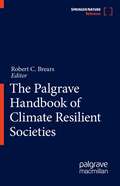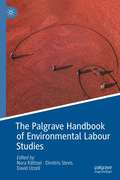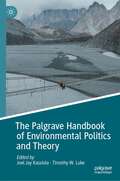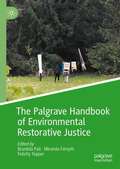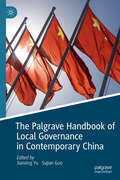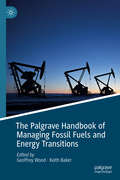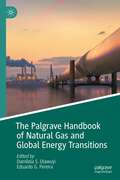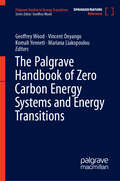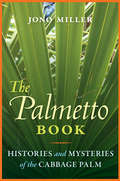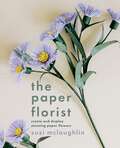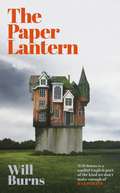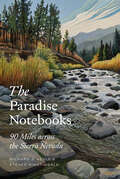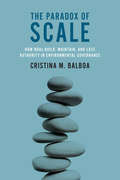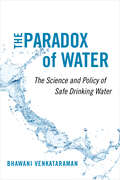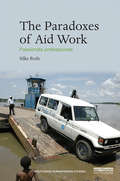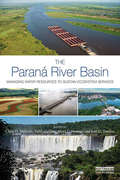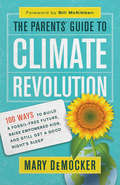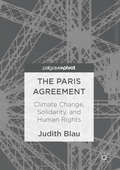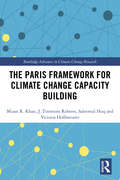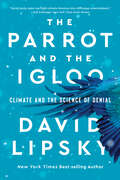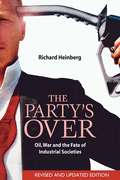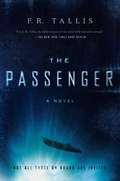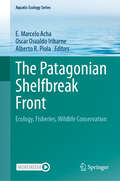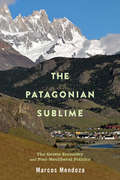- Table View
- List View
The Palgrave Handbook of Climate Resilient Societies
by Robert C. BrearsThe effects of climate change are beginning to be felt around the world with rising temperatures, changing precipitation levels, more frequent and severe storms and longer more intensive droughts threatening human life and livelihoods and damaging property and infrastructure. As such, society in all countries – both developing and developed – need to increase their resilience to the impacts of climate change, where resilience is the ability of a system to absorb stresses and adapt in ways that improve the overall sustainability of the system; enabling it to be better prepared for future climate change impacts.In this context, a climate resilient society is one that is: reflective (learns from experiences); robust (both people and infrastructure can withstand the impacts of extreme conditions); forward-thinking (with plans made to ensure systems function during extreme events); flexible (so systems and plans can change, evolve or adopt alternative strategies); resourceful (to respond quickly to extreme events); inclusive (so all communities including the vulnerable are involved in planning); and integrated (so people, systems, decision-making and investments are mutually supportive of common goals).The Climate Resilient Societies Major Reference Work includes chapters covering a range of themes that provide readers with an invaluable overview on how various levels of government have attempted to create climate resilient societies. In particular, each chapter, under its respective theme, will address how a government, or series of governments, at various levels in non-OECD and/or OECD countries, have implemented innovative climate resilient policies that seek synergies across strategies, choices and actions, in an attempt to build a climate resilient society. Each chapter will address one specific sub-theme out of the population of themes covered in the Major Reference Work: Water, Energy, Agriculture and Food, Built environment and Infrastructure, Transport, Human health, Society, Disaster, Business and Economy, and Financing Climate Resilience.
The Palgrave Handbook of Environmental Labour Studies
by Nora Räthzel Dimitris Stevis David UzzellIn this comprehensive Handbook, scholars from across the globe explore the relationships between workers and nature in the context of the environmental crises. They provide an invaluable overview of a fast-growing research field that bridges the social and natural sciences. Chapters provide detailed perspectives of environmental labour studies, environmental struggles of workers, indigenous peoples, farmers and commoners in the Global South and North. The relations within and between organisations that hinder or promote environmental strategies are analysed, including the relations between workers and environmental organisations, NGOs, feminist and community movements.
The Palgrave Handbook of Environmental Politics and Theory (Environmental Politics and Theory)
by Timothy W. Luke Joel Jay KassiolaThis Handbook aims to provide a unique and convenient one-volume reference work, exhibiting the latest interdisciplinary explorations in this urgently burgeoning field of intellectual and practical importance. Due to its immense range and diversity, environmental politics and theory necessarily encompasses: empirical, normative, policy, political, organizational, and activist discussions unfolding across many disciplines. It is a challenge for its practitioners, let alone newcomers, to keep informed about the ongoing developments in this fast-changing area of study and to comprehend all of their implications. Through the planned volume’s extensive scope of contributions emphasizing environmental policy issues, normative prescriptions, and implementation strategies, the next generation of thinkers and activists will have very useful profiles of the theories, concepts, organizations, and movements central to environmental politics and theory. It is the editors’ aspiration that this volume will become a go-to resource on the myriad perspectives relevant to studying and improving the environment for advanced researchers as well as an introduction to new students seeking to understand the basic foundations and recommended resolutions to many of our environmental challenges. Environmental politics is more than theory alone, so the Handbook also considers theory-action connections by highlighting the past and current: thinkers, activists, social organizations, and movements that have worked to guide contemporary societies toward a more environmentally sustainable and just global order. Chapter “Eco-Anxiety and the Responses of Ecological Citizenship and Mindfulness” is available open access under a Creative Commons Attribution 4.0 International License via link.springer.com.
The Palgrave Handbook of Environmental Restorative Justice
by Brunilda Pali Miranda Forsyth Felicity TepperThis handbook explores the dynamic new field of Environmental Restorative Justice. Authors from diverse disciplines discuss how principles and practices of restorative justice can be used to address the threats and harms facing the environment today. The book covers a wide variety of subjects, from theoretical discussions about how to incorporate the voice of future generations, nature, and more-than-human animals and plants in processes of justice and repair, through to detailed descriptions of actual practices of Environmental Restorative Justice. The case studies explored in the volume are situated in a wide range of countries and in the context of varied forms of environmental harm – from small local pollution incidents, to endemic ongoing issues such as wildlife poaching, to cataclysmic environmental catastrophes resulting in cascades of harm to entire ecosystems. Throughout, it reveals how the relational and caring character of a restorative ethos can be conducive to finding solutions to problems through sharing stories, listening, healing, and holding people and organisations accountable for prevention and repairing of harm. It speaks to scholars in Criminology, Sociology, Law, and Environmental Justice and to practitioners, policy-makers, think-tanks and activists interested in the environment.
The Palgrave Handbook of Local Governance in Contemporary China
by Sujian Guo Jianxing YuThis Handbook provides a comprehensive overview of local governance in China, and offers original analysis of key factors underpinning trends in this field drawing on the expertise of scholars both inside and outside China. It explores and analyzes the dynamic interaction and collaboration among multiple governmental and non-governmental actors and social sectors with an interest in the conduct of public affairs to address horizontal challenges faced by the local government, society, economy, and civil community and considers key issues such as governance in urban and rural areas, the impact of technology on governance and related issues of education, healthcare, environment and energy.As the result of a global and interdisciplinary collaboration of leading experts, this Handbook offers a cutting-edge insight into the characteristics, challenges and trends of local governance and emphasizes the promotion of good governance and democratic development in China.
The Palgrave Handbook of Managing Fossil Fuels and Energy Transitions
by Keith Baker Geoffrey WoodThis Handbook is the first volume to comprehensively analyse and problem-solve how to manage the decline of fossil fuels as the world tackles climate change and shifts towards a low-carbon energy transition. The overall findings are straight-forward and unsurprising: although fossil fuels have powered the industrialisation of many nations and improved the lives of hundreds of millions of people, another century dominated by fossil fuels would be disastrous. Fossil fuels and associated greenhouse gas emissions must be reduced to a level that avoids rising temperatures and rising risks in support of a just and sustainable energy transition. Divided into four sections and 25 contributions from global leading experts, the chapters span a wide range of energy technologies and sources including fossil fuels, carbon mitigation options, renewables, low carbon energy, energy storage, electric vehicles and energy sectors (electricity, heat and transport). They cover varied legal jurisdictions and multiple governance approaches encompassing multi- and inter-disciplinary technological, environmental, social, economic, political, legal and policy perspectives with timely case studies from Africa, Asia, Australia, Europe, North America, South America and the Pacific. Providing an insightful contribution to the literature and a much-needed synthesis of the field as a whole, this book will have great appeal to decision makers, practitioners, students and scholars in the field of energy transition studies seeking a comprehensive understanding of the opportunities and challenges in managing the decline of fossil fuels.
The Palgrave Handbook of Natural Gas and Global Energy Transitions
by Damilola S. Olawuyi Eduardo G. PereiraThe Palgrave Handbook of Natural Gas and Global Energy Transitions provides an in-depth and authoritative examination of the transformative implications of the ongoing global energy transitions for natural gas markets across the world.With case studies from Africa, Asia, Europe, North America, Latin America, South America, Australia, and the Middle East, the volume introduces readers to the latest legal, policy, technological, and fiscal innovations in natural gas markets in response to ongoing global energy transitions. It outlines the risk mitigation strategies and contractual techniques — focusing on resilience planning, low-carbon business models, green procurement, climate-smart infrastructure development, accountability, gender justice, and other sustainability safeguards — that are required to maximize the full value of natural gas as a catalyst for a just and equitable energy transition and for energy security across the world.Written in an accessible style, this book outlines the guiding principles for a responsible and low-carbon approach to the design, financing, and implementation of natural gas development and commercialization. It is an indispensable text and reference work for students, scholars, practitioners, and stakeholders in natural gas, energy, infrastructure, and environmental investments and projects.
The Palgrave Handbook of Zero Carbon Energy Systems and Energy Transitions (Palgrave Studies in Energy Transitions)
by Geoffrey Wood Vincent Onyango Komali Yenneti Mariana LiakopoulouThe Palgrave Handbook of Zero-Carbon Energy Systems and Energy Transitions provides a comprehensive and authoritative source of information, analysis and recommendations on the multi- and inter-disciplinary subject of zero carbon energy systems. The Handbook will advance thinking and research underlying the on-going energy transition by; covering a wide range of energy technologies and sources (e.g. fossil fuels, renewables, low carbon energy) including investigating the potential of new and alternative technologies and fuel sources and looking at the power, heating/cooling and transport sectors; Looking at varied legal jurisdictions and governance approaches including developing and developed countries and investigating potential new approaches to achieving a zero carbon energy system; Providing a broad range of theoretical and methodological approaches from a range of disciplines; Inclusion of a global range of case studies from Africa, Arctic, Asia, Australasia, Europe, the Middle East, the Americas (Central, North and South) and the Pacific, from the international, national, sub-national to city/community level.
The Palmetto Book: Histories and Mysteries of the Cabbage Palm
by Jono MillerThe natural and cultural history of an iconic plant The palmetto, also known as the cabbage palm or Sabal palmetto, is an iconic part of the southeastern American landscape and the state tree of Florida and South Carolina. In The Palmetto Book, Jono Miller offers surprising facts and dispels common myths about an important native plant that remains largely misunderstood.Miller answers basic questions such as: Are palms trees? Where did they grow historically? When should palmettos be pruned? What is swamp cabbage and how do you prepare it? Did Winslow Homer’s watercolors of palmettos inadvertently document rising sea level? How can these plants be both flammable and fireproof? Based on historical research, Miller argues that cabbage palms can live for more than two centuries. The palmettos that were used to build Fort Moultrie at the start of the Revolutionary War thwarted a British attack on Charleston—and ended up on South Carolina’s flag.Delving into biology, Miller describes the anatomy of palm fronds and their crisscrossed leaf bases, called bootjacks. He traces the underground “saxophone” structure of the young plant’s root system. He explores the importance of palmettos for many wildlife species, including Florida Scrub-Jays and honey bees. Miller also documents how palmettos can pose problems for native habitats, citrus groves, and home landscapes.From Low Country sweetgrass baskets to Seminole chickees and an Elvis Presley movie set, the story of the cabbage palm touches on numerous dimensions of the natural and cultural history of the Southeast. Exploring both the past and present of this distinctive species, The Palmetto Book is a fascinating and enlightening journey.
The Paper Florist: Create and display stunning paper flowers
by Suzi MclaughlinPaper flowers are not only beautiful, but also incredibly versatile. They can be used to create everything from simple home decorations and gorgeous gifts to unique centrepieces and decorative one-off bouquets, all made from the most basic and inexpensive materials. Suzi McLaughlin's step-by-step tutorials cover a beautiful array of flowers including bluebells, peonies, poppies, cherry blossom and more, and will teach everything you need to know. Make delicate lifelike flowers, or let your imagination run wild and use Suzi's techniques to create playful hybrids. Adorn your home with colour and style with just a few simple steps.The flowers are accompanied by templates for every shape used in the book, as well as instructions on how to display your creations to their full potential. Whether you want to make a gloriously blousy bouquet, a bejewelled cherry blossom branch or an impressive floral centrepiece, this book is sure to delight and inspire.
The Paper Lantern
by Will Burns'Will Burns is a soulful English poet of the kind we don't make enough of' MAX PORTER'Hugely affecting and timely' LUKE TURNER'A boldly struck chord, one that contains many of the dissonances, but also the harmonies, found in England today' CHRIS POWERIn THE PAPER LANTERN, a single speaker charts and interrogates the shifts in mood and understanding that have defined a surreal, transformative period in both his own history and that of the surrounding area. Set in a shuttered pub - The Paper Lantern - in a village in the very middle of the country adjacent to the Chequers estate, the narrator embarks on a series of walks in the Chiltern Hills, which become the landscape for evocations of a past scarred with trauma and a present lacking compass. From local raves in secret valleys and the history of landmarks such as Halton House, to the fallout of the lockdown period, climate change and capitalism, THE PAPER LANTERN creates a tangible, lived-in, complicated rendering of a place.
The Paradise Notebooks: 90 Miles across the Sierra Nevada
by Steven Nightingale Richard J. NevleIn The Paradise Notebooks, Richard J. Nevle and Steven Nightingale take us across the spectacular Sierra Nevada mountain range on a journey illuminated by incandescent poetry and fascinating fact.Over the course of twenty-one pairs of short essays, Nevle and Nightingale contemplate the natural phenomena found in the Sierra Nevada. From granite to aspen, to fire, to a rare, endemic species of butterfly, these essay pairs explore the natural history and mystical wonder of each element with a balanced and captivating touch. As they weave in vignettes from their ninety-mile backpacking trip across the range, Nevle and Nightingale powerfully reconceive the Sierra Nevada as both earthly matter and transcendental offering, letting us into a reality in which nature holds just as much spiritual importance as it does physical.In a time of rapid environmental degradation, The Paradise Notebooks offers a way forward—a whole-minded, learned, loving attention to place that rekindles our joyful relationship with the living world.
The Paradox of Scale: How NGOs Build, Maintain, and Lose Authority in Environmental Governance (The\mit Press Ser.)
by Cristina M. BalboaAn examination of why NGOs often experience difficulty creating lasting change, with case studies of transnational conservation organizations in Southeast Asia and the Pacific.Why do nongovernmental organizations face difficulty creating lasting change? How can they be more effective? In this book, Cristina Balboa examines NGO authority, capacity, and accountability to propose that a “paradox of scale” is a primary barrier to NGO effectiveness. This paradox—when what gives an NGO authority on one scale also weakens its authority on another scale—helps explain how NGOs can be seen as an authority on particular causes on a global scale, but then fail to effect change at the local level. Drawing on case studies of transnational conservation organizations in Southeast Asia and the Pacific, The Paradox of Scale explores how NGOs build, maintain, and lose authority over time.Balboa sets a new research agenda for the study of governance, offering practical concepts and analysis to help NGO practitioners. She introduces the concept of authority as a form of legitimated power, explaining why it is necessary for NGOs to build authority at multiple scales when they create, implement, or enforce rules. Examining the experiences of Conservation International in Papua New Guinea, International Marinelife Alliance in the Philippines, and the Community Conservation Network in Palau, Balboa explains how a paradox of scale can develop even for those NGOs that seem powerful and effective. Interdisciplinary in its approach, The Paradox of Scale offers guidance for interpreting the actions and pressures accompanying work with NGOs, showing why even the most authoritative NGOs often struggle to make a lasting impact.
The Paradox of Water: The Science and Policy of Safe Drinking Water
by Bhawani VenkataramanWater is a molecular marvel. Its seemingly simple formula—H2O—dictates the properties that make water both essential for life and easily contaminated. Herein lies the paradox of water: we cannot live without it, but it is easily rendered "unsafe." The Paradox of Water explores the intersection of the scientific, social, and policy implications around access to safe drinking water. Drinking water is the smallest fraction of water used by a nation. Yet, the quality of this fraction is what dictates whether a community is healthy, educated, and economically sustained. Bhawani Venkataraman argues that a deeper understanding of the chemical nature of water is crucial to appreciating the challenges around access to safe drinking water. Drawing on recent research and case studies from the US and abroad, this book offers students an understanding of: the processes and oversight needed to ensure the safety of drinking water the role of the precautionary principle in managing drinking water potential solutions for expanding sustainable and equitable access to safe drinking water
The Paradoxes of Aid Work: Passionate Professionals (Routledge Humanitarian Studies)
by Silke RothThis book explores what attracts people to aidwork and to what extent the promises of aidwork are fulfilled. 'Aidland' is a highly complex and heterogeneous context which includes many different occupations, forms of employment and organizations. Analysing the processes that lead to the involvement in development cooperation, emergency relief and human rights work and tracing the pathways into and through Aidland, the book addresses working and living conditions in Aidland, gender relations and inequality among aid personnel and what impact aidwork has on the life-courses of aidworkers. In order to capture the trajectories that lead to Aidland a biographical perspective is employed which reveals that boundary crossing between development cooperation, emergency relief and human rights is not unusual and that considering these fields as separate spheres might overlook important connections. Rich reflexive data is used to theorize about the often contradictory experiences of people working in aid whose careers are shaped by geo-politics, changing priorities of donors and a changing composition of the aid sector. Exploring the life worlds of people working in aid, this book contributes to the emerging sociology and anthropology of aidwork and will be of interest to professionals and researchers in humanitarian and development studies, sociology, anthropology, political science and international relations, international social work and social psychology.
The Paraná River Basin: Managing Water Resources to Sustain Ecosystem Services (Earthscan Series on Major River Basins of the World)
by Chris D. MetcalfeThis book provides insight into the hydrology, ecosystem services and management of water resources in the Paraná River basin, including the importance of water to the socio-economic development of the countries within the watershed. Running through Brazil. Paraguay and Argentina, the Paraná River and its watershed is home to some of South America's major population centers as well as important ecosystems threatened by development. At the same time, the river is a major resource driving the economies of the nations within its boundaries. This volume examines the impacts of environmental degradation, and the tradeoffs between the energy sector and the maintenance of ecosystem services. In particular, it focuses on the threats from development to sensitive ecosystems within the basin and the challenges of transboundary management of water resources. In addition to presenting wider perspectives on water management, the volume specifically covers water infrastructure, aquatic ecosystems, water quality, geomorphological influences and the impact of climate change. Finally, by assessing each country's current status in meeting the Sustainable Development Goals this volume provides a timely analysis as national governments within the basin are becoming increasingly concerned about the sustainability of the freshwater ecosystems within the Paraná River basin. This book will be of great interest to students and scholars of water and natural resource management, environmental policy, sustainable development and Latin American studies. It will also be relevant to water management professionals.
The Parents’ Guide to Climate Revolution: 100 Ways to Build a Fossil-Free Future, Raise Empowered Kids, and Still Get a Good Night’s Sleep
by Bill McKibben Mary DeMocker“Relax,” writes author Mary DeMocker, “this isn’t another light bulb list. It’s not another overwhelming pile of parental ‘to dos’ designed to shrink your family’s carbon footprint through eco-superheroism.” Instead, DeMocker lays out a lively, empowering, and doable blueprint for engaging families in the urgent endeavor of climate revolution. In this book’s brief, action-packed chapters, you’ll learn hundreds of wide-ranging ideas for being part of the revolution — from embracing simplicity parenting, to freeing yourself from dead-end science debates, to teaching kids about the power of creative protest, to changing your lifestyle in ways that deepen family bonds, improve moods, and reduce your impact on the Earth. Engaging and creative, this vital resource is for everyone who wants to act effectively — and empower children to do the same.
The Paris Agreement
by Judith BlauThis book discusses the immediate and severe threat posed by global climate change and the various obstacles that stand in the way of action. Judith Blau presents scientific evidence relevant to The Paris Agreement (COP-21): an international treaty that promises to strengthen the global response to climate change. As she reckons with the dangers of catastrophic planetary heating, Blau discusses the clash between the deeply ingrained American tradition of individualism and the collective action and acknowledgement of intertwined fate needed to address climate change. She acknowledges that America's capitalist bent stands in contrast to the idea of the "commons"--a concept that we need to embrace if climate change is to be mitigated. The volume also explains the foundations of international human rights standards as they relate to climate change. Drawing from guiding principles of human rights and equality, the book concludes hopefully--suggesting that the people of the world can meet the challenge posed by climate change by at once acknowledging shared humanity and celebrating difference.
The Paris Framework for Climate Change Capacity Building (Routledge Advances in Climate Change Research)
by J. Timmons Roberts Saleemul Huq Mizan R Khan Victoria HoffmeisterThe Paris Framework for Climate Change Capacity Building pioneers a new era of climate change governance, performing the foundational job of clarifying what is meant by the often ad-hoc, one-off, uncoordinated, ineffective and unsustainable practices of the past decade described as 'capacity building' to address climate change. As an alternative, this book presents a framework on how to build effective and sustainable capacity systems to meaningfully tackle this long-term problem. Such a reframing of capacity building itself requires means of implementation. The authors combine their decades-long experiences in climate negotiations, developing climate solutions, climate activism and peer-reviewed research to chart a realistic roadmap for the implementation of this alternative framework for capacity building. As a result, this book convincingly makes the case that universities, as the highest and sustainable seats of learning and research in the developing countries, should be the central hub of capacity building there. This will be a valuable resource for students, researchers and policy-makers in the areas of climate change and environmental studies.
The Park and the People: A History of Central Park
by Roy Rosenzweig Elizabeth BlackmarThis exemplary social history is the first full-scale account of Central Park ever published. In rich detail, Elizabeth Blackmar and Roy Rosenzweig tell the story of Central Park's people--the merchants and landowners who launched the project; the immigrant and African-American residents who were displaced by the park; the politicians, gentlemen, and artists who disputed its design and operation; the German gardeners, Irish laborers, and Yankee engineers who built it; and the generations of New Yorkers for whom Central Park was their only backyard.
The Parrot and the Igloo: Climate And The Science Of Denial
by David LipskyA New York Times Editors’ Choice Named a Best Book of the Year in The New Yorker, Publishers Weekly, Chicago Tribune, and EcoLit Books A USA Today Must-Read Summer Book "David Lipsky spins top-flight climate literature into cliffhanger entertainment." —Zoë Schlanger, New York Times Book Review The New York Times best-selling author explores how “anti-science” became so virulent in American life—through a history of climate denial and its consequences. In 1956, the New York Times prophesied that once global warming really kicked in, we could see parrots in the Antarctic. In 2010, when science deniers had control of the climate story, Senator James Inhofe and his family built an igloo on the Washington Mall and plunked a sign on top: AL GORE'S NEW HOME: HONK IF YOU LOVE CLIMATE CHANGE. In The Parrot and the Igloo, best-selling author David Lipsky tells the astonishing story of how we moved from one extreme (the correct one) to the other. With narrative sweep and a superb eye for character, Lipsky unfolds the dramatic narrative of the long, strange march of climate science. The story begins with a tale of three inventors—Thomas Edison, George Westinghouse, and Nikola Tesla—who made our technological world, not knowing what they had set into motion. Then there are the scientists who sounded the alarm once they identified carbon dioxide as the culprit of our warming planet. And we meet the hucksters, zealots, and crackpots who lied about that science and misled the public in ever more outrageous ways. Lipsky masterfully traces the evolution of climate denial, exposing how it grew out of early efforts to build a network of untruth about products like aspirin and cigarettes. Featuring an indelible cast of heroes and villains, mavericks and swindlers, The Parrot and the Igloo delivers a real-life tragicomedy—one that captures the extraordinary dance of science, money, and the American character.
The Party's Over
by Richard HeinbergThe world is about to run out of cheap oil and change dramatically. Within the next few years, global production will peak. Thereafter, even if industrial societies begin to switch to alternative energy sources, they will have less net energy each year to do all the work essential to the survival of complex societies. We are entering a new era, as different from the industrial era as the latter was from medieval times. In The Party's Over, Richard Heinberg places this momentous transition in historical context, showing how industrialism arose from the harnessing of fossil fuels, how competition to control access to oil shaped the geopolitics of the twentieth century and how contention for dwindling energy resources in the twenty-first century will lead to resource wars in the Middle East, Central Asia and South America. He describes the likely impacts of oil depletion and all of the energy alternatives. Predicting chaos unless the United States--the world's foremost oil consumer--is willing to join with other countries to implement a global program of resource conservation and sharing, he also recommends a "managed collapse" that might make way for a slower-paced, low-energy, sustainable society in the future. More readable than other accounts of this issue, with fuller discussion of the context, social implications and recommendations for personal, community, national and global action, Heinberg's updated book is a riveting wake-up call for human-kind as the oil era winds down, and a critical tool for understanding and influencing current US foreign policy.
The Passenger: A Novel
by F. R. TallisThe new supernatural thriller from F. R. Tallis, who takes his readers under the wartime seas of the stormy North Atlantic in 1942, where not all those on board are invited . . . A German submarine, U-330, patrols the stormy inhospitable waters of the North Atlantic. It is commanded by Siegfried Lorenz, a maverick SS officer who does not believe in the war he is bound by duty and honor to fight in. U-330 receives a triple-encoded message with instructions to collect two prisoners from a vessel located off the Icelandic coast and transport them to the base at Brest—and a British submarine commander, Sutherland, and a Norwegian academic, Professor Bjornar Grimstad, are taken on board. Contact between the prisoners and Lorenz has been forbidden, and it transpires that this special mission has been ordered by an unknown source, high up in the SS. It is rumored that Grimstad is working on a secret weapon that could change the course of the war . . . Then, Sutherland goes rogue, and a series of shocking, brutal events occur. In the aftermath, disturbing things start happening on the boat. It seems that a lethal, supernatural force is stalking the crew, wrestling with Lorenz for control. A thousand feet under the dark, icy waves, it doesn't matter how loud you scream...
The Patagonian Shelfbreak Front: Ecology, Fisheries, Wildlife Conservation (Aquatic Ecology Series #13)
by E. Marcelo Acha Oscar Osvaldo Iribarne Alberto R. PiolaThis book provides a compilation of basic information on the topic of the Patagonian Shelfbreak front, but integrally reanalyzes this under modern paradigms. The book provides a synthesis of the ecosystem characteristics, encompassing physical and chemical oceanography, plankton, nekton and benthos communities, fisheries and conservation issues. It provides hypothesis to guide future research, and recommendations for policymakers and stakeholders. Fronts play key roles in marine ecosystems, and shelfbreak fronts are ubiquitous elsewhere in the world ocean, broadening the interest of our proposal. The Patagonian shelfbreak front is a hot spot of marine life, with several associated fisheries and intensive use by marine birds and mammals. This book will contribute to fill the information gap of the Southwestern Atlantic, a region where there is a growing interest in terms of conservation and management actions. Its primary audience are researchers and postgraduate students, being also relevant for conservation scientists and resource managers.
The Patagonian Sublime: The Green Economy and Post-Neoliberal Politics
by Marcos MendozaThe Patagonian Sublime provides a vivid, accessible, and cutting-edge investigation of the green economy and New Left politics in Argentina. Based on extensive field research in Glaciers National Park and the mountain village of El Chaltén, Marcos Mendoza deftly examines the diverse social worlds of alpine mountaineers, adventure trekkers, tourism entrepreneurs, seasonal laborers, park rangers, land managers, scientists, and others involved in the green economy. Mendoza explores the fraught intersection of the green economy with the New Left politics of the Néstor Kirchner and Cristina Fernández de Kirchner governments. Mendoza documents the strategies of capitalist development, national representation, and political rule embedded in the “green productivist” agenda pursued by Kirchner and Fernández. Mendoza shows how Andean Patagonian communities have responded to the challenges of community-based conservation, the fashioning of wilderness zones, and the drive to create place-based monopolies that allow ecotourism destinations to compete in the global consumer economy.
